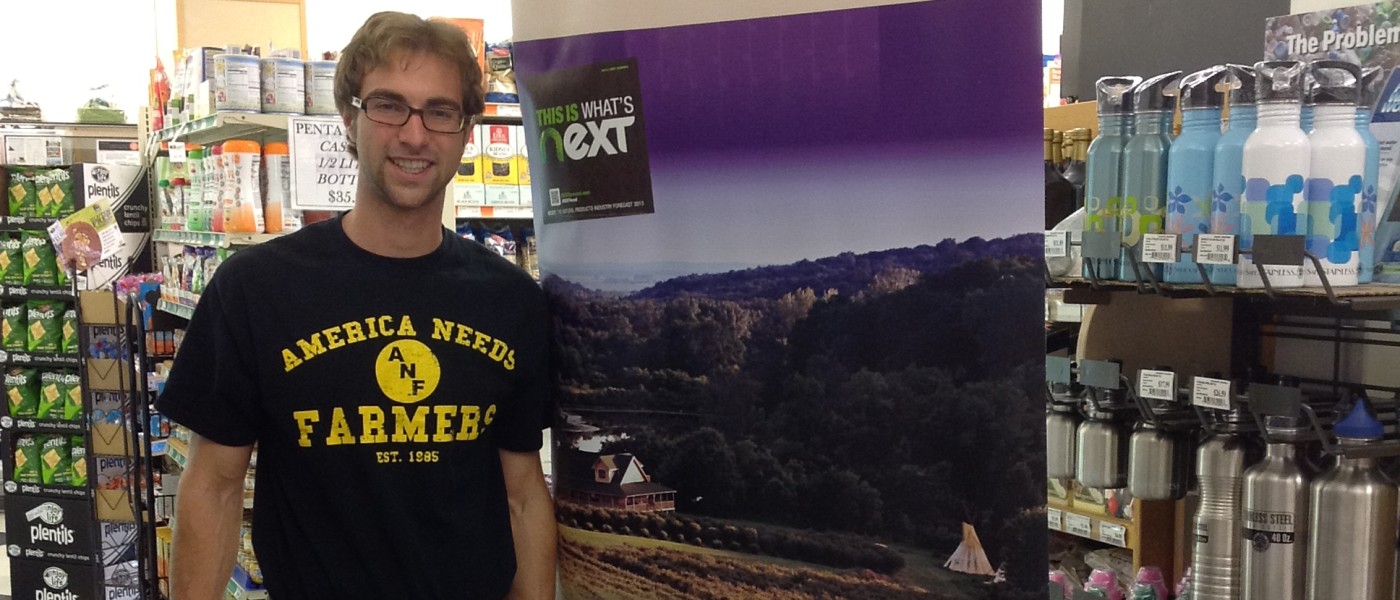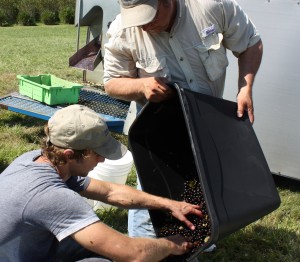Andrew Pittz is a sixth-generation family farmer who has created a market by becoming the first aronia berry farm in the country and worked to show family farming can remain a sustainable career in rural Iowa.
It’s purple, filled with antioxidants, known for its abundance of health benefits and native to eastern North America. And yet it was never commercially cultivated here. That is, until the Pittz family got innovative and reintroduced the aronia berry to the United States two generations ago.
Andrew Pittz is a sixth-generation family farmer cultivating aronia berries on the Sawmill Hollow Family Farm, located in the remote Loess Hills region of Iowa. Starting in 1882, Andrew’s family grew corn and soybeans on Echo Family Farm, a century farm located about 4 miles from Sawmill Hollow Family Farm. When Andrew’s parents, Vaughn and Cindy Pittz, bought Sawmill Hollow in the mid-1990s they were faced with an interesting challenge, wanting to develop a sustainable farming practice in a remote area that could not feasibly use large machinery. When his dad noticed the aronia berry as an ingredient in a “super drink” he decided to investigate. He discovered that aronia berries are native to North America and that the perennial nature of the berry preserves the nutrients in soil. It wasn’t long before the Pittz family invested in 207 plants and began the first commercially grown aronia berry farm in the United States.
Iowa produces more corn and soybeans than any other state and now, as a result of the Sawmill Hollow Family Farm, the state also produces the most aronia berries. “So it’s kind of a neat deal,” Andrew said, “that we have an intergenerational family, both close and extended, growing conventional crops or what you would think of as traditional to Iowa, but we also have family like myself that is growing nontraditional, complimentary agriculture.”
The aronia berry, sometimes known as the black chokeberry, has been studied for its incredibly beneficial health characteristics. The USDA recognizes the berry as having 3 to 4 times more antioxidants than pomegranates, blueberries and goji berries. Research has proven that the aronia berry has anti-inflammatory traits, can reduce blood pressure and LDL cholesterol, and can treat or prevent metabolic syndrome. Further, a study from Ohio State University showed that the berries stopped the growth of colon cancer and even killed 20 percent of the cancer cells.
Aronia berries grow best in swamp or woodlands, but commercial growers typically grow the plants in full sun. These berries are resistant to disease, drought, pollution, and insects, making chokeberries the perfect crop for the Pittz family to take on. Aronia berries are often grown decoratively in gardens for their distinct color, particularly in the fall. Aronia berries bud very early in the growing season, meaning aronia farmers, like apple, cherry, or grape growers, have to be careful for frost or hail damage to the delicate buds and flowers, which eventually mature into the full fruit.
Though Sawmill Hollow Family Farm is still firmly rooted in its handpicking, certified organic background, the Pittz family has expanded the products that they market beyond simply berries. “We’re the first aronia berry farm in the country,” Andrew said, “so naturally everything we do is the first.” With the help of local partnerships, the farm sells aronia products varying from wine to health supplements to gourmet food products. When we spoke with them, the Pittz family was revving up for the launch of the first aronia berry coffee, which they will produce through a partnership with Opportunities Unlimited, a private non-profit organization that employs people with developmental disabilities. Andrew is particularly excited at this opportunity to provide people with meaningful employment through an aronia berry product.
In addition to seemingly defining the aronia berry market for the country, Andrew and his parents maintain astounding drive to spread health and sustainability within the community. “A lot of what we do is break ground in the social front of growing a rural business,” Andrew said. Andrew tries to demonstrate rural values in the marketplace to act as a leader in sustainable agriculture, working outside of just the farm. He promotes “open source agriculture” as much as possible, working to share effective practices with other farmers through workshops or regional outreach. For Sawmill Hollow, it also means leading collaborations resulting in what Andrew calls a “21st Century Barn Raising,” one such example includes Missouri Valley area farms, the public library association, and Google coming together to create a shared agritourism platform and extend the rural sense of place online.
In 2005, Sawmill Hollow hosted the first aronia berry field day, an event that began as a field day to educate the community and have aronia-focused entertainment. Over the course of the past seven years this event has grown from a simple field day with 35 attendees to North American Aronia Berry Festival attracting thousands of guests and artisans representing numerous states and countries. The festival is held during September, which has since been named “Aronia Berry Month” in Iowa. There is no charge for admission, but each year the Pittz family invites a non-profit organization to park all of the attendees’ cars for a suggested donation the non-profit is able to keep. The festival is filled with musicians, artists, organic experts, educational activities for kids and unique food made with aronia berries. Like the annual Farm Aid concert, it’s all centered around celebrating the “culture in agriculture.”
The hard work of the Pittz family has not gone unnoticed. Sawmill Hollow Family Farm has been named Iowa’s Rural Business of the Month, Renew Rural Iowa’s Entrepreneur of the Month, Missouri Valley’s Business of the Year and the Iowa Farm Environmental Leader Award. Sawmill Hollow was also the only family farm out of 51 companies recognized by NewHope360 for impacting natural and organic products, ranking 26th on the list. Andrew speaks at the National Small Farmer Forum and is the youngest member ever of the North-Central Region’s Farmer Rancher Committee. Additionally, he has spoken at both the Farm Bill Symposium and USDA roundtable on rural development in Washington, D.C
Andrew aims for their farm to remain a part of the conversation to demonstrate that rural communities can be successful and sustainable in order to ensure the next generation of family farmers enters into a thriving economy. Understanding that the roles behind rural and urban farming are very different, Andrew explained that both are still valuable and a positive part of American culture. While serving on the Beginning Farmer Rancher Committee of the USDA-SARE , Andrew learned that everyone in farming faces a different challenge in getting started. That said, there is commonality in the goal to provide for the community, whether on a local or global scale. “We’re going to have to come up with a road map that we can all believe in and share. Promising legislative starts will help further the agricultural industry and include the Beginning Farmer and Rancher Opportunity Act.” Andrew said, “It is important to make sure that everyone knows just how important farming is and how critical it is to the continued success and prosperity of our country.”
Further Reading
- Other Farmer Heroes have come up with innovative ways to keep their farms operating. Kate Canney found a way to farm despite not owning her own farmland. Dru Peters and Homer Walden share their creative methods for growing for the benefit of other farmers. And Chris and Donna Garza are finding success online, through researching farming practices and also selling their meat directly to customers.
- Read more about the aronia berry on Wikipedia.
- For resources to find food from family farmers in your area, check out our Find Good Food page.




